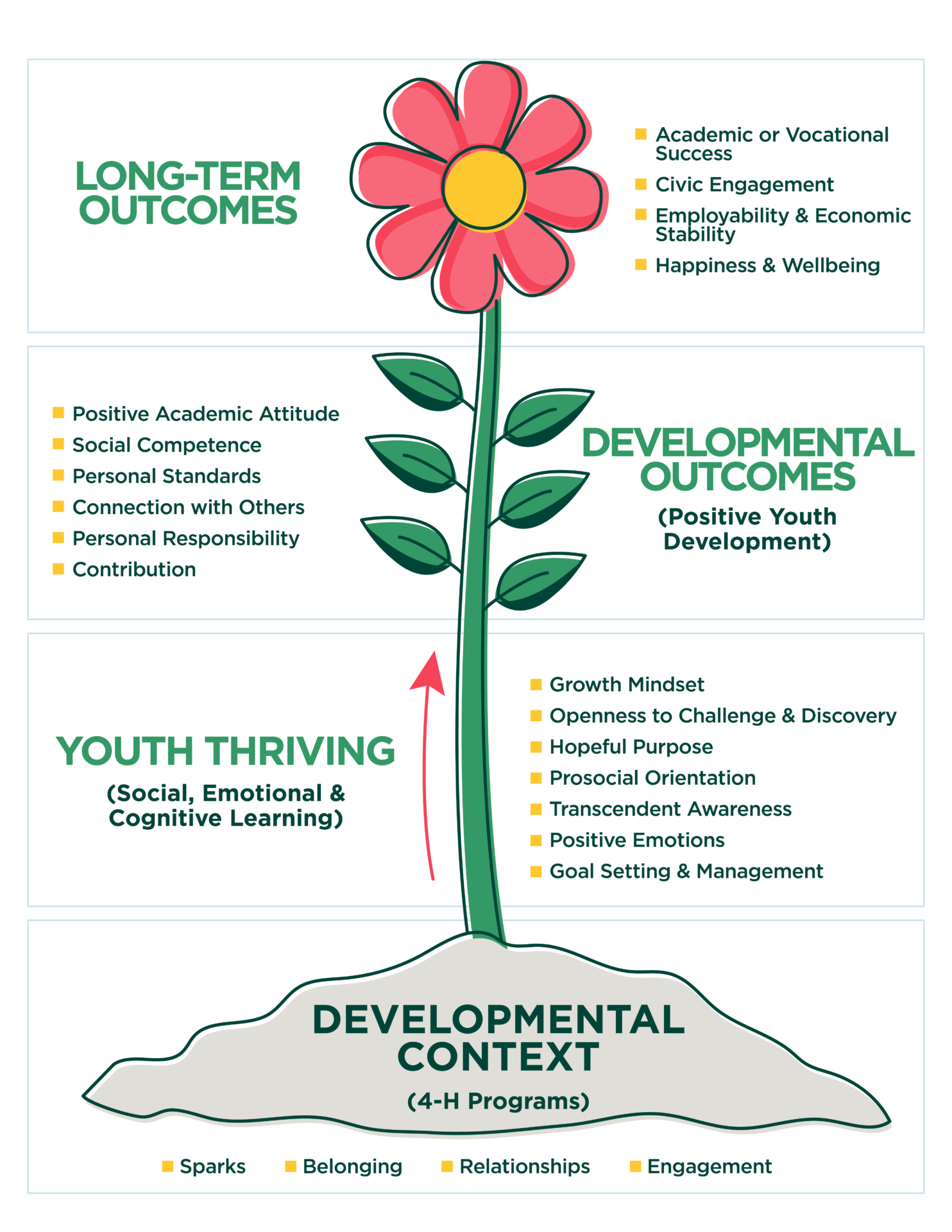Volunteer Learning Opportunities
Continued education is critical to providing meaningful and positive experiences for young people in 4-H. Through research-backed resources and new learning opportunities, Arkansas 4-H is dedicated to making sure each volunteer is informed and prepared to serve the incredible youth of Arkansas in their diverse roles.
Here you can find useful resources such as models used to develop 4-H programming, links to relevant research, upcoming trainings and much more.
4-H Thrive Model
The core piece that 4-H uses to develop its programs is the 4-H Thrive Model, pictured below.

This model starts with the programming that takes place in the organization. In order to provide young people a positive experience, core values such as sparks, belonging, relationships and engagement must be met for growth and thriving to take place. Other models and research pieces used to develop 4-H programs are listed below.
For more information on the 4-H Thrive Model, visit here: 4-H Thrive Model Resources
Relevant Research
This nationally recognized program provides positive youth development through addressing the eight (8) "Essential Elements" of youth needs.
Topics covered include 4 core concepts of providing youth a sense of Belonging, Mastery, Independence, and Generosity. Training in this program is 10-12 hours, but can be taken in a series of one-hour face-to-face trainings. Check with your local extension office if you are interested in this program or being trained.
Info on the Eight (8) Essential Elements: Eight Essential Elements
Designed to provide practical skills for volunteers, the Volunteer Research, Knowledge,
and Competency Model covers Communication, Organization, Program Management, Educational
Design & Delivery, Positive Youth Development, and Interpersonal Characteristics.
More information on the VRKC can be found at the following sites:
National 4-H Website: VRKC Model
VRKC Overview: VRKC (Morris and Bodhe, 2023)
This framework poses as the basis for onboarding, training and retaining 4-H volunteers. Without informed and willing volunteers, 4-H could not thrive and especially could not provide the quality of programs that it has to offer.
To learn about the framework, visit here: National Framework for 4-H Volunteerism
Upcoming Volunteer Opportunities
These trainings will cover topics specific to Healthy Living and STEM, including training for the Project Learning Tree curriculum and Food Challenge.
Delta District Training- March 20, 2026
Ouachita District Training- February 20, 2026
Ozark District Training- March 6, 2026
Registration for these trainings are through ZSuite. Volunteers must have a ZSuite account in order to register and attend.
For questions concerning these trainings, please contact Breanna Wade at bwade@uada.edu .
Mark your calendars for November 13-15, 2026 for the State Volunteer Conference! Check back for more information.
For questions concerning this conference, please contact Breanna Wade at bwade@uada.edu .
Offered every fall, this national training is held at the Rock Eagle 4-H Center in Eatonton, Georgia. Lead by 4-H volunteers, county agents, and state staff from across the United States, this training is geared to provide practical hands-on experiences to bring back to your programs.
Any current 4-H volunteer can attend this event. Carpooling will be available.
Date: October 1-4, 2026
Cost: Varies by Type of Registration (Virtual vs In-Person)
Location: Rock Eagle 4-H Center, Eatonton, GA.
Every year, Arkansas 4-H participates in a variety of state and national programs. In order for these to be available for youth to attend, 4-H professionals and volunteers are needed to chaperone.
If you are interested in chaperoning an event, contact your local 4-H Professional to see what events are in need and how you can help.
Additional trainings such as First Aid, CPR, Mental Health First Aid, CERT, ServSafe and more may be available by request during your service as a 4-H Volunteer. If you would like to see one of these trainings or a training similar come to your area, ask your 4-H Professional about what is available. Trainings requests can be sent to the state 4-H office for review to Breanna Wade, bwade@uada.edu .
Arkansas 4-H YouTube
Past virtual volunteer opportunities are available on the Arkansas 4-H YouTube Channel. There you will find Virtual Volunteer Forums, Virtual Volunteer Conversations and 4-H 4th Thursdays. Additionally, you can find science, leadership, and healthy living videos spanning a variety of different topics!